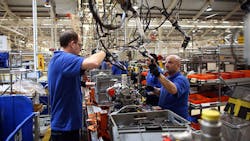UK Manufacturing Growth Slows to 2-Year Low as Exports Falter
U.K. manufacturing growth unexpectedly slowed to the weakest in two years last month as export orders contracted amid a weakening of the global economy.
IHS Markit’s Purchasing Managers’ Index fell to 52.8 in August, the firm said Monday, down from 53.8 a month earlier, and below the 53.9 forecast by economists. A gauge of new orders for exports fell below the 50 level that indicates expansion for the first time since April 2016.
The pound fell after the report and traded down 0.6% at $1.2891 as of 9:35 a.m. in London.
Markit’s report also showed manufacturing production rose at the slowest pace in 17 months, while both input and output prices increased, with companies reporting higher costs of metals, electronic components and energy which were passed onto clients. Optimism among firms slumped to a 22-month low, with some citing ongoing uncertainty about Brexit and the exchange rate.
The slowdown means the sector is unlikely to contribute to add to economic growth in the third quarter, Markit said. “The main constraint was the trend in new export business,” said Rob Dobson, director at IHS Markit. “Foreign demand declined for the first time since April 2016, despite the weakness of sterling, amid reports of slower global economic growth and the increasingly uncertain trading environment.”
A study by Bloomberg Economics last month found that British exporters failed to make the most of the “sweet spot” created by the pound’s post-referendum drop and the time to do so may have passed. Businesses exporting from the U.K. mostly pocketed the exchange-rate windfall after the 2016 Brexit vote, rather than taking the opportunity to bolster output, the report said.
By Lucy Meakin
About the Author
Bloomberg
Licensed content from Bloomberg, copyright 2016.
